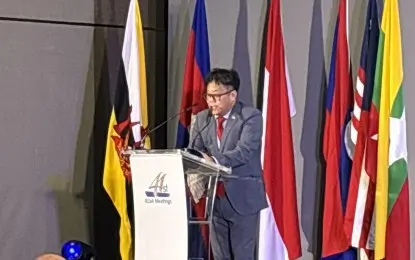Southeast Asia’s social security leaders are urged to formulate a regional framework that would integrate systems, allowing people to move from one country to another with their social security benefits intact.
Speaking at the Philippine-hosted 41st ASEAN Social Security Association (ASSA) Conference, Board, and Secretariat Meetings on Monday, Malaysia’s social security agency PERKESO Deputy Chief Executive Officer Edmund Cheong Peck Huang said the Association of Southeast Asian Nations (ASEAN) should “lead the world in social protection that transcends borders”.
“We live in a world that is more connected than ever, and with Southeast Asia becoming increasingly mobile, millions of our workers are crossing borders to pursue better opportunities,” he said.
“As they move, they deserve to know that their social security benefits move with them— it’s time we seriously consider in ASSA the portability of social security benefits,” he added.
Delivering his presentation titled Navigating the Future of Social Security, he emphasized the need for social security institutions to future-proof their systems— one that is resilient and capable of absorbing shocks.
“Our world is changing fast. From economic disruptions, health crisis to climate shocks, the question is not if we face these challenges again, but when,” he said.
“Our social security systems must be resilient and adaptable, capable of absorbing shocks and empowering recovery,” he added.
The ASEAN Declaration on Portability of Social Security Benefits for Migrant Workers in ASEAN was adopted in November 2022 at the 40th and 41st ASEAN Summits in Phnom Penh, Cambodia.
It is the ability of social security benefits to be transferred to and accessed by the migrant workers upon return to their home countries, ensuring that monetary contributions they and their employers paid will not be lost nor forfeited.
Meanwhile, he commended various digital innovations and inclusive social protection initiatives in the region, including the Philippines’ AlkanSSSya program for the self-employed; Malaysia’s mobile applications that offer on-demand benefits; Indonesia’s digital payment solutions; and Singapore’s digital ID system.
At the end of the summit, the ASSA is hoping to come up with a “sustainability pledge” to reflect the group’s collective resolve to address evolving challenges in the region, including climate change, rapidly aging population, and high informal sectors.
“With the strong leadership demonstrated today by the Government Service Insurance System (GSIS), I’m optimistic that ASSA will continue to drive transformative change benefiting both current and future generations, that is, move forward with renewed determination to build a more secure, inclusive, and resilient future,” said former ASSA Chairperson Ahmad Zulqarnain Onn in a separate press conference.
Meanwhile, National Health Security Office Intelligent Data Innovation Division data engineer Paweena Sremuang said data security is one of the challenges Thailand encounters in its big data management for universal healthcare services.
Sremuang disclosed that they are challenged by hackers just like any other country or companies that have all their clients’ information stored in online platforms or the cloud.
“But we also have the team to deal with the hacking 24 hours a day seven days a week, whole year round,” she said, apart from encrypting data in their systems.
Despite having the platform and system for data integration, there are still instances when data are not fully-integrated with relevant agencies and these data are under-utilized.
To ensure that no citizen is left behind for quality healthcare services, Sremuang said their national statistics department continues to collect data from residents in far-flung areas lacking internet connectivity.
“They collect data from birth to death by using a national ID card. So the local government will do the duty of correcting the data and register by hand if it is too remote but all in all, at the end, everything will be registered in the ID card and you can get the data if you want to,” she added.
The three-day conference at the Seda Manila Bay Hotel in Parañaque City features panel discussions, interactive sessions, and keynote messages from leading experts and ASEAN leaders.
The outcomes and recommendations from this event will contribute to the broader ASEAN agenda and generate actionable insights and strategies that will strengthen cooperation and drive forward the enhancement of social protection networks across the region.
It was attended by members of the Philippine Social Security Association, composed of the GSIS, Philippine Charity Sweepstakes Office, Social Security System, Philippine Health Insurance Corporation, Home Development Mutual Fund and Employees’ Compensation Commission.
ASSA comprises of social security institutions from ASEAN member states. — PNA




